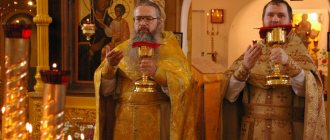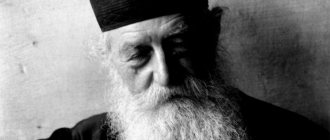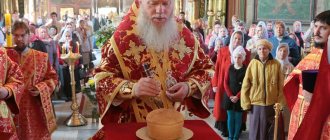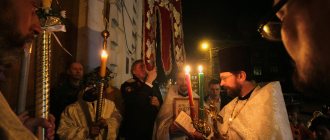Audio version of the article
Table of contents
- The essence and meaning of fasting
- Discretion in fasting
This brochure will help us spend the cleansing days of Great Lent with dignity. It is compiled on the basis of the well-known work of Nikolai Evgrafovich Pestov “Modern practice of Orthodox piety”. Grant us, Lord, a favorable Lent!
The essence and meaning of fasting
This generation is driven out only by prayer and fasting. (Matt. 17:21) When you fasted... Did you fast for Me? (Zech. 7:5)
Instructions for a Christian to fast can vary greatly depending on the health of the Christian's body. It may be in perfect health in a young person, not so healthy in an elderly person, or in a serious illness. Hence, the instructions of the church on fasting (on Wednesdays and Fridays) or during periods of multi-day fasts (Rozhdestven, Great, Petrov and Assumption) can vary greatly depending on the age and physical state of a person’s health. All instructions fully apply only to a physically healthy person. In case of physical illness or for the elderly, the instructions should be taken carefully and judiciously.
Just as often among those who consider themselves Christians, one can find disdain for fasting and a misunderstanding of its meaning and essence.
Fasting is viewed by them as something obligatory only for monks, dangerous or harmful to health, as a relic from the old ritual - a dead letter of the rule, which it is time to do away with, or, in any case, as something unpleasant and burdensome.
It should be noted to all who think this way that they do not understand either the purpose of fasting or the purpose of the Christian life. Perhaps it is in vain that they call themselves Christians, since they live with their hearts together with the godless world, which has a cult of its body and self-indulgence.
A Christian, first of all, should think not about the body, but about his soul and worry about its health. And if he really began to think about her, then he would rejoice at the fast, in which the entire environment is aimed at healing the soul, as in a sanatorium - at healing the body.
The time of fasting is a time especially important for spiritual life, it is “an acceptable time, it is a day of salvation” (2 Cor. 6:2).
If the soul of a Christian yearns for purity and seeks mental health, then it should try to make the best possible use of this time that is beneficial for the soul.
That is why among true lovers of God mutual congratulations on the onset of fasting are common.
But what exactly is fasting? And isn’t there self-deception among those who consider it necessary to fulfill this only to the letter, but do not love it and are burdened by it in their hearts? And is it possible to call fasting only the observance of the rules about not eating meat on fast days?
Will fasting be fasting if, apart from some changes in the composition of food, we think neither about repentance, nor about abstinence, nor about cleansing the heart through intense prayer?
One must assume that this will not be fasting, although all the rules and customs of fasting will be observed. St. Barsanuphius the Great says: “Physical fasting means nothing without the spiritual fasting of the inner man, which consists of protecting oneself from passions.
This fast of the inner man is pleasing to God and will compensate for your lack of bodily fasting” (if you cannot observe the latter as you would like).
St. says the same thing. John Chrysostom: “Whoever limits fasting to one abstinence from food greatly dishonors him. It’s not just the mouth that should fast; no, let the eye, the ear, the hands, the feet, and our whole body fast.”
As Fr. writes. Alexander Elchaninov: “In the dormitories there is a fundamental misunderstanding of fasting. What is more important is not fasting in itself, like not eating this and that or depriving yourself of something in the form of punishment - fasting is only a proven way to achieve the desired results - through exhaustion of the body to reach the refinement of spiritual mystical abilities, darkened by the flesh, and thereby facilitating your approach to God...
Fasting is not hunger. A diabetic, a fakir, a yogi, a prisoner, and just a beggar are starving. Nowhere in the Lent services does it speak of fasting only in our ordinary sense, i.e. like not eating meat, etc. Everywhere there is one call: “we fast, brothers, physically, we fast and spiritually.” Consequently, fasting only has a religious meaning when it is combined with spiritual exercises. Fasting is equal to refinement. A normal, biologically prosperous person is inaccessible to the influence of higher powers. Fasting undermines a person’s physical well-being, and then he becomes more accessible to the influences of another world, and his spiritual filling begins.”
As mentioned earlier, the human soul is seriously ill. The Church sets aside certain days and periods of time in the year when a person’s attention should be especially focused on healing from mental illness. These are fasting and fast days.
According to Bishop Herman: “Fasting is pure abstinence in order to restore the lost balance between body and spirit, in order to return to our spirit its supremacy over the body and its passions.”
Fasting, of course, has other goals (they will be discussed below), but the main one is the expulsion of the evil spirit - the ancient serpent - from one’s soul. “This race is driven out only by prayer and fasting,” the Lord said to His disciples.
The Lord himself showed us an example of fasting, fasting for 40 days in the desert, from where he “returned in the power of the Spirit” (Luke 4:14).
As St. says Isaac the Syrian: “Fasting is a weapon prepared by God... If the Lawgiver Himself fasted, then how could anyone who was obligated to keep the law not fast?..
Before fasting, the human race did not know victory and the devil never experienced defeat... Our Lord was the leader and firstborn of this victory...
And as soon as the devil sees this weapon on one of the people, this enemy and tormentor immediately comes into fear, thinking and remembering his defeat in the desert by the Savior, and his strength is crushed... He who remains in fasting has an unshakable mind” (Word thirty).
It is quite obvious that the feat of repentance and prayer during fasting should be accompanied by thoughts about one’s sinfulness and, of course, abstinence from all entertainment - going to theaters, cinema and guests, light reading, cheerful music, watching TV for entertainment, etc. If all this still attracts the heart of a Christian, then let him make an effort to tear his heart away from it, at least during the days of fasting.
Here we need to remember that on Fridays, St. Seraphim not only fasted, but also remained in strict silence on this day. As Fr. writes. Alexander Elchaninov: “Lent is a period of spiritual effort. If we cannot give our whole lives to God, then let us devote at least periods of fasting completely to Him - we will strengthen our prayers, increase our mercy, tame our passions, and make peace with our enemies.”
The words of the wise Solomon apply here: “For everything there is a season, and a time for every purpose under heaven. …a time to cry and a time to laugh; a time to mourn and a time to dance... a time to be silent and a time to speak,” etc. (Eccl. 3:1-7).
For physically healthy people, the basis of fasting is considered to be abstinence from food. Here we can distinguish 5 degrees of physical fasting:
- Refusal of meat.
- Refusal of dairy.
- Refusal of fish.
- Refusal of oil.
- Depriving yourself of food for any period of time.
Naturally, only healthy people can go to the last stages of fasting. For the sick and elderly, the first degree of fasting is more consistent with the rules.
The strength and effectiveness of fasting can be assessed by the strength of deprivation and sacrifice. And naturally, not only the formal replacement of the fast table with a fast table constitutes a true fast: you can prepare delicious dishes from fast food and thus, to some extent, satisfy both your voluptuousness and your greed for it.
We must remember that it is indecent for someone who repents and grieves over his sins to eat sweet and plentiful meals during fasting, even if they are (formally) lenten dishes. We can say that there will be no fasting if a person gets up from the table with delicious lean dishes and a feeling of a full stomach.
There will be few sacrifices and hardships, and without them there will be no true fasting.
“Why do we fast, but You don’t see?” cries the prophet Isaiah, denouncing the Jews, who hypocritically observed rituals, but whose hearts were far from God and His commandments (Is. 58:3).
In some cases, sick Christians replace (on their own or on the advice of their confessors) abstinence in food with “spiritual fasting.” The latter is often understood as stricter attention to oneself: keeping oneself from irritability, condemnation, and quarrels. All this, of course, is good, but in ordinary times can a Christian allow himself to sin, or get irritated, or condemn? It is quite obvious that a Christian must always “be sober” and be attentive, protecting himself from sin and everything that can offend the Holy Spirit. If he is unable to control himself, then this will probably happen equally both on ordinary days and during fasting. Hence, replacing a food fast with a similar “spiritual” fast is most often self-deception.
Therefore, in those cases when, due to illness or a large shortage of food, a Christian cannot observe the usual norms of fasting, then let him do everything he can in this regard, for example: give up all entertainment, sweets and delicacies, fast at least on Wednesday and Friday, will try to ensure that the most delicious food is served only on holidays. If a Christian, due to old age or ill health, cannot refuse fasting food, then he should at least limit it somewhat on fasting days, for example, not eat meat - in a word, to one degree or another, still join the fast.
Some refuse to fast for fear of weakening their health, showing morbid suspiciousness and lack of faith, and always strive to feed themselves abundantly with quick food in order to achieve good health and to maintain the “fatness” of the body. And how often they suffer from all sorts of diseases of the stomach, intestines, kidneys, teeth...
In addition to showing your feelings of repentance and hatred of sin, fasting has other sides. Fasting times are not random days.
Wednesday is the tradition of the Savior - the highest of the moments of the fall and shame of the human soul, going in the person of Judas to betray the Son of God for 30 pieces of silver.
Friday is the endurance of mockery, painful suffering and death on the cross of the Redeemer of mankind. Remembering them, how can a Christian not limit himself through abstinence?
Great Lent is the path of the God-man to the Calvary sacrifice.
The human soul has no right, does not dare, unless it is a Christian, to pass indifferently past these majestic days - significant milestones in time.
How dare she later - at the Last Judgment, stand at the right hand of the Lord, if she is indifferent to His sorrow, blood and suffering in those days when the Universal Church - Earthly and Heavenly - remembers them.
What should the post consist of? It is impossible to give a general measure here. It will depend on your state of health, age and living conditions. But here you must certainly touch a nerve with your carnality and voluptuousness.
At the present time - a time of weakening and decline of faith - those regulations on fasting, which in the old days were strictly observed by pious Russian families, seem unattainable to us.
Here, for example, is what Lent consists of according to the church charter, the obligatory nature of which applied equally to both the monk and the layman.
According to this charter, during Great Lent it is necessary to: complete abstinence for the whole day, Monday and Tuesday of the first week and Friday of Holy Week.
Only the weaker can eat food on Tuesday evening of the first week. On all other days of Lent, except Saturdays and Sundays, only dry food is allowed and only once a day - bread, vegetables, peas - without oil and water.
Boiled food with vegetable oil is only allowed on Saturdays and Sundays. Wine is allowed only on days of church remembrance and during long services (for example, on Thursday in the fifth week). Fish - only on the Annunciation of the Blessed Virgin Mary and Palm Sunday.
Although such a measure seems excessively harsh to us, it is, however, achievable for a healthy body.
In the everyday life of an old Russian Orthodox family one can see the strict observance of fasting days and fasts. Even princes and kings fasted in a way that, perhaps, many of the monks do not fast now.
Thus, during Lent, Tsar Alexei Mikhailovich dined only three times a week - on Thursday, Saturday and Sunday, and on the other days he ate only a piece of black bread with salt, a pickled mushroom or cucumber, washed down with kvass.
Some Egyptian monks in ancient times practiced complete forty-day abstinence from food during Lent, following in this regard the example of Moses and the Lord Himself.
Forty-day fasts were carried out twice by one of the brothers of the Optina Hermitage, Schemamonk Vassian, who lived there in the middle of the 19th century. This schema-monk, by the way, is the same as St. Seraphim, to a large extent, ate grass “sniff”. He lived to be 90 years old.
For 37 days, nun Lyubov of the Marfo-Mariinsky Monastery did not eat or drink (except for one communion). It should be noted that during this fast she did not feel any weakening of strength and, as they said about her, “her voice thundered in the choir as if even stronger than before.”
She made this fast before Christmas; it ended at the end of the Christmas liturgy, when she suddenly felt an irresistible desire to eat. Unable to control herself any longer, she immediately went to the kitchen to eat.
It should be noted, however, that the norm described above and recommended by the church for Lent is no longer considered by everyone to be so strictly obligatory for everyone. The Church recommends, as a known minimum, only a transition from fasting to lenten food in accordance with its instructions for each of the fasts and fasting days.
Compliance with this norm is considered mandatory for completely healthy people. Still, she leaves more to the zeal and zeal of every Christian: “I want mercy, not sacrifice,” says the Lord (Matthew 9:13). At the same time, we must remember that fasting is necessary not for the Lord, but for ourselves for the salvation of our soul. “When you fasted... were you fasting for Me?” says the Lord through the mouth of the prophet Zechariah (7:5).
There is another side to the post. Now his time is over.. The Church solemnly celebrates the holiday that ends Lent.
Can someone who, to some extent, has not partaken in this fast, celebrate and experience this holiday with dignity? No, he will feel like the impudent one in the Lord’s parable, who dared to come to the feast “not wearing wedding clothes,” i.e. not in spiritual clothing, purified by repentance and fasting.
Even if a person, out of habit, went to a festive service and sat down at the festive table, he would only feel an uneasiness of conscience and a coldness in his heart. And his inner ear will hear the formidable words of the Lord addressed to him: “Friend, how did you come here not wearing wedding clothes?” And his soul will be “thrown into outer darkness,” i.e. will remain in the grip of despondency and sadness, in an atmosphere of spiritual hunger - “crying and gnashing of teeth.”
Pity yourself, those who neglect, shun and run from fasting.
Fasting is the cultivation of the ability of the human spirit to fight against its enslavers - Satan and the softened and spoiled body. The latter must be obedient to the spirit, but in reality most often it is the master of the soul.
As the shepherd Father John S. writes (holy right John of Kronstadt - editor's note): “Whoever rejects fasting takes away both from himself and from others weapons against his many-passionate flesh and against the devil, who are strong against us especially through our intemperance, from which all sin arises.”
True fasting is a struggle; this is in the full sense of the word “narrow and straitened path”, the salvation of which the Lord spoke about.
The Lord commands to hide your fast from others (Matthew 6:18). But a Christian may not be able to hide his fast from his neighbors. Then it may happen that relatives and friends will take up arms against the fasting person: “have pity on yourself, don’t torture yourself, don’t kill yourself,” etc.
Gentle at first, the persuasion of relatives can then turn into irritation and reproaches. The spirit of darkness will rise up against the one who fasts through his loved ones, gives arguments against fasting and sends temptations, as he once tried to do with the Lord fasting in the desert.
Let the Christian foresee all this in advance. Let him also not expect that when he begins fasting, he will immediately receive some kind of gracious consolation, warmth in his heart, tears of repentance and concentration in prayer.
This does not come immediately, it must still be earned through struggle, feat and sacrifice: “serve me, and then eat and drink yourself,” says the parable to the servant (Luke 17:8). Those who have gone through the path of severe fasting even testify to the weakening of prayer and dulling of interest in spiritual reading at the beginning of fasting.
Fasting is a treatment, and the latter is often not easy. And only at the end of its course can one expect recovery, and from fasting can one expect the fruits of the Holy Spirit - peace, joy and love.
In essence, fasting is a feat and is associated with faith and boldness. Fasting is pleasing and pleasing to the Lord as an impulse of the soul reaching for purity, striving to throw off the chains of sin and free the spirit from slavery to the body.
The Church also considers it one of the effective means by which one can shift the wrath of God to mercy or bend the will of the Lord to fulfill a prayer request.
Thus, in the Acts of the Apostles it is described how the Antiochian Christians, before setting off to preach to Sts. App. Paul and Barnabas “kept fasting and prayer” (Acts 13:3).
Therefore, fasting is practiced in the church as a means of preparing oneself for any undertaking. Having a need for something, individual Christians, monks, monasteries or churches imposed fasting on themselves with intense prayer.
In addition, fasting has one more positive side, which the Angel drew attention to in the vision of Hermas (see the book “Shepherd Hermas”).
By replacing fast food with simpler and cheaper food, or reducing its quantity, a Christian can reduce his own costs. And this will give him the opportunity to devote more funds to works of mercy.
The angel gave the following instruction to Hermas: “On the day on which you fast, eat nothing except bread and water, and having calculated the expenses that you would have made on this day for food, following the example of previous days, set aside the remainder from this day and give it to the widow. , orphan or poor; in this way you will humble your soul, and the one who receives from you will be satisfied and will pray to God for you.”
The angel also pointed out to Hermas that fasting is not an end in itself, but only an auxiliary means to cleansing the heart. And the fast of one who strives for this goal and does not fulfill the commandments of God cannot be pleasing to God and is fruitless.
Essentially, the attitude towards fasting is a touchstone for the soul of a Christian in his relationship to the Church of Christ, and through the latter - to Christ.
As Fr. writes. Alexander Elchaninov: “...In fasting, a person reveals himself: some manifest the highest abilities of the spirit, while others only become irritable and angry - fasting reveals the true essence of a person.”
A soul living by living faith in Christ cannot neglect fasting. Otherwise, she will unite herself with those who are indifferent to Christ and religion, with those who, according to Archpriest. Valentin Sventsitsky:
“Everyone eats - even on Maundy Thursday, when the Last Supper is celebrated and the Son of Man is betrayed; and on Good Friday, when we hear the cry of the Mother of God at the tomb of the Crucified Son on the day of His burial.
For such people there is neither Christ, nor the Mother of God, nor the Last Supper, nor Golgotha. What kind of post can they have?”
Addressing Christians, Fr. Valentin writes: “Keep and observe fasting as a great church shrine. Every time you abstain from what is prohibited during the days of fasting, you are with the whole Church. You are doing in complete unanimity and unity of feeling what the entire Church and all the holy saints of God have been doing since the very first days of the Church’s existence. And this will give you strength and firmness in your spiritual life.”
The meaning and purpose of fasting in the life of a Christian can be summarized by the following words of St. Isaac the Syrian:
“Fasting is the guardianship of all virtue, the beginning of struggle, the crown of the abstinent, the beauty of virginity, the source of chastity and prudence, the teacher of silence, the predecessor of all good deeds...
From fasting and abstinence a fruit is born in the soul - knowledge of the mysteries of God.”
Start small.
There is no need to immediately fast for a whole week. Start by skipping one meal a week and fast for several weeks. Then skip two meals at a time and gradually work your way up to fasting for the whole day. And then you can fast for two days, allowing yourself only juice.
A juice fast is when you abstain from all solid and liquid foods, only allowing yourself water and juice. Juice contains enough sugar and nutrients to support the body without crowding out hunger. Abstaining from water is generally not recommended for any period of time.
Discretion in fasting
I want mercy, not sacrifice. (Matt. 9:13) Show... prudence in virtue. (2 Pet. 1:5) Everything good in us has a certain line, crossing which it imperceptibly turns into evil. (Arch. Valentin Sventsitsky)
All of the above about fasting applies, however, we repeat, only to healthy people. As with any virtue, fasting also requires prudence.
As Rev. writes. Cassian the Roman: “Extremes, as the holy fathers say, on both sides are equally harmful - both excess of fasting and satiety of the belly. We know some who, not being overcome by gluttony, were overthrown by immeasurable fasting, and fell into the same passion of gluttony, due to weakness resulting from excessive fasting.
Moreover, immoderate abstinence is more harmful than satiety, because from the latter, due to repentance, you can move on to correct action, but from the former you cannot.
The general rule of moderation in abstinence is that everyone, in accordance with his strength, body condition and age, ate as much food as was necessary to maintain the health of the body, and not as much as the desire for satiety required.
A monk should conduct the matter of fasting as wisely as if he had been in the body for a hundred years; and thus curb the movements of the soul - forget grievances, cut off sadness, put sorrows at nothing - as one who can die every day.”
It is worth remembering how ap. Paul warned those who foolishly (willfully and arbitrarily) fasted - “this has only the appearance of wisdom in self-willed service, humility and weariness of the body, in some neglect of the saturation of the flesh” (Col. 2:23).
At the same time, fasting is not a ritual, but a secret of the human soul, which the Lord orders to be hidden from others.
The Lord says: “When you fast, do not be sad, like the hypocrites, for they put on gloomy faces in order to appear to people as fasting. Truly I tell you that they are already receiving their reward.
But you, when you fast, anoint your head and wash your face, so that you may not appear to men as you fast, but to your Father who is in the secret place, and your Father who sees in secret will reward you openly” (Matthew 6:16-18).
And therefore, a Christian must hide both his repentance - prayer and inner tears, as well as his fasting and his abstinence in food.
Here you must be afraid of any revelation of your difference from others and be able to hide your feat and your deprivations from them.
Here are a few examples from the lives of saints and ascetics.
St. Macarius the Great never drank wine. However, when he visited other monks, he did not refuse wine, hiding his abstinence.
But his disciples tried to warn their owners, telling them: “If he drinks wine from you, then know that when he returns home, he will deprive himself of even water.”
The Optina elder Leonid once had to live for several days with the diocesan bishop. The latter’s table was abundant with fish and various tasty dishes, sharply different from the modest monastery meal of the Optina Hermitage.
The elder did not refuse delicious dishes, but when he returned to Optina, he deprived himself of food for several days, as if making up for the abstinence he had lost while visiting.
In all those cases when a faster must take food together with other, more infirm brothers, he should not, according to the instructions of the holy fathers, reproach them with his abstinence.
So Saint Abba Isaiah writes: “If you absolutely want to abstain more than others, then retire to a separate cell and do not upset your weak brother.”
Not only for the sake of preserving oneself from vanity, one must strive not to expose one’s post.
If the post for some reason confuses others, causes their reproaches, or perhaps ridicule, accusations of hypocrisy, etc. - and in these cases one must try to keep the secret of fasting, preserving it in spirit, but deviating from it formally. The Lord’s commandment has an application here: “Do not cast your pearls before swine” (Matthew 7:6).
Fasting will also be unreasonable when it interferes with the hospitality of those who treat you; By this we will reproach those around us for neglecting fasting.
The following story is told about the Moscow Metropolitan Philaret: one day he came to his spiritual children just in time for dinner. Out of duty of hospitality, he had to be invited to dinner. Meat was served at the table, and it was a fast day.
The metropolitan showed no sign and, without embarrassing the hosts, partook of the humble meal. Thus, he placed condescension towards the weaknesses of his spiritual neighbors and love higher than observing fasting.
Church institutions generally cannot be treated formally, and, while ensuring the exact execution of the rules, no exceptions should be made from the latter. We must also remember the words of the Lord that “the Sabbath is for man, and not man for the Sabbath” (Mark 2:27).
As Metropolitan Innocent of Moscow writes: “There were examples that even monks, such as St. John Climacus, ate all kinds of food and even meat at all times.
But how much? So much so that I could only live, and this did not prevent him from worthily communing the Holy Mysteries and, finally, did not prevent him from becoming a saint...
Of course, it is not prudent to break the fast unnecessarily by eating fast food. Anyone who can observe fasting by sorting food, do so; but, most importantly, observe and do not break your spiritual fast, and then your fast will be pleasing to God.
But whoever does not have the opportunity to sort out food, eat everything that God gives, but without excess; but be sure to fast strictly with your soul, mind and thoughts, and then your fast will be as pleasing to God as the fast of the strictest hermit.
The purpose of fasting is to lighten and pacify the body, curb desires and disarm passions.
Therefore, when the church asks you about food, it does not so much ask about what food do you eat? – how much about what you use it for?
The Lord Himself approved of the action of King David when, out of necessity, he had to break the rule and eat “the shewbread, which neither he nor those who were with him were to eat” (Matthew 12:4).
Therefore, taking into account the need, it is possible, even with a sick and weak body and old age, to make concessions and exceptions during fasting.
St. ap. Paul writes to his disciple Timothy: “From now on, drink more than just water, but use a little wine for the sake of your stomach and your frequent illnesses” (1 Tim. 5:23).
St. Barsanuphius the Great and John say: “What is fasting if not punishment of the body in order to pacify a healthy body and make it weak for passions, according to the word of the Apostle: “When I am weak, then I am strong” (2 Cor. 12:10).
And illness is more than this punishment and is charged instead of fasting - it is valued even more than it. Whoever endures it with patience, thanking God, through patience receives the fruit of his salvation.
Instead of weakening the strength of the body by fasting, it is already weakened by illness.
Thank God that you have been freed from the labor of fasting. Even if you eat ten times a day, do not be sad: you will not be condemned for that, since you are not doing this to please yourself.”
On the correctness of the norm of fasting, St. Barsanuphius and John also give the following instruction: “Concerning fasting, I will say: examine your heart, whether it has been stolen by vanity, and if it has not been stolen, examine again, whether this fasting does not make you weak in doing things, for this weakness should not exist, and if this does not harm you, your fast is correct.”
As the hermit Nicephorus said in V. Sventsitsky’s book “Citizens of Heaven”: “The Lord requires not hunger, but heroism. Feat is what a person can do the greatest within his own strength, and the rest is by grace. Our strength is now weak, and the Lord does not require great feats from us.
I tried to fast hard, and I see that I can’t. I’m exhausted - I don’t have the strength to pray as I should. One day I was so weak from fasting that I couldn’t read the rules to get up.”
Here is an example of an incorrect post.
Ep. Herman writes: “Exhaustion is a sign of incorrect fasting; it is as harmful as satiety. And the great elders ate soup with butter during the first week of Lent. There is no point in crucifying sick flesh, but must be supported.”
So, any weakening of health and ability to work during fasting already indicates its incorrectness and excess of its norm.
“I prefer to be exhausted more from work than from fasting,” one shepherd said to his spiritual children.
It is best when fasting people are guided by the instructions of experienced spiritual leaders. We should remember the following incident from the life of St. Pachomius the Great. In one of his monasteries, a monk was lying in the hospital, exhausted by illness. He asked the servants to give him some meat. They refused his request, based on the rules of the monastery charter. The patient asked to be referred to as St. Pachomius. The monk was struck by the extreme exhaustion of the monk, began to cry, looking at the sick man, and began to reproach the hospital brethren for their hardness of heart. He ordered that the patient’s request be immediately fulfilled in order to strengthen his weakened body and encourage his sad soul.
The wise ascetic of piety, Abbess Arsenia, wrote to the elderly and sick brother of Bishop Ignatius Brianchaninov during Lent: “I am afraid that you are burdening yourself with heavy fasting food and I ask you to forget that it is now fasting, and eat fast food, nutritious and light. The difference of days was given to us by the church, like a bridle to healthy flesh, but to you the sickness and infirmity of old age was given.”
However, those who break fast due to illness or other infirmity should still remember that there may also be a certain amount of lack of faith and intemperance.
Therefore, when the spiritual children of the elder Fr. Alexei Zosimovsky had to break the fast according to the doctor’s orders, then the elder ordered in these cases to curse himself and pray like this: “Lord, forgive me that, according to the doctor’s orders, due to my weakness, I broke the holy fast,” and not to think that it was like that and necessary.
Speaking about fasting as about scarcity and a change in the composition of food, it should be noted that this feat is imputed to nothing by the Lord if a Christian does not at the same time keep the Lord’s commandments about love, mercy, selfless service to others, in a word, everything that is asked from him on the day of the Last Judgment (Matt. 25:31-46).
This is already stated with exhaustive clarity in the book of the prophet Isaiah. The Jews cry out to God: “Why do we fast, but You don’t see? We humble our souls, but You don’t know?” The Lord, through the mouth of the prophet, answers them: “On the day of your fast, you do your will and demand hard work from others. So you fast for quarrels and strife and in order to beat others with a bold hand: you do not fast at this time so that your voice is heard on high. Is this the fast that I have chosen, the day on which a man languishes his soul, when he bends his head like a reed and spreads rags and ashes under him? Can you call this a fast and a day pleasing to the Lord? This is the fast that I have chosen: loose the chains of unrighteousness, untie the bonds of the yoke, set the oppressed free and break every yoke; divide your bread with the hungry, and bring the wandering poor into your home; When you see a naked person, dress him and do not hide from your half-blood. Then your light will break forth like the dawn, and your healing will quickly increase, and your righteousness will go before you, and the glory of the Lord will follow you. Then you will call, and the Lord will hear; You will cry and He will say, “Here am I”” (Is. 58:3-9).
This wonderful passage from the book of the prophet Isaiah denounces many - both ordinary Christians and shepherds of the flock of Christ. He denounces those who think to be saved only by observing the letter of fasting and forgetting about the commandments of mercy, love for one’s neighbor and service to them. He denounces those shepherds who “bind heavy and unbearable burdens and lay them on people’s shoulders” (Matthew 23:4). These are the shepherds who demand from their spiritual children strict adherence to the “rules” of fasting, without taking into account their advanced age or their sick condition. After all, the Lord said: “I want mercy, not sacrifice” (Matthew 9:13).
SATIS St. Petersburg, 2005
Fast from something else - not necessarily food.
Fasting from food is not suitable for everyone. Some people are held back from such a post by health conditions. Fasting is not limited to abstaining from food. As Martyn Lloyd-Jones said, “Fasting is abstaining from anything at all if it will achieve a necessary spiritual goal.”
If it seems wise to you not to worsen your health by abstaining from food, abstain from television, the computer, social media, or any other activity that distracts you from enjoying God. The Apostle Paul even suggests that spouses abstain from sex during prayer (1 Cor. 7).
How to properly create a Lenten menu
The preparation of a Lenten menu should be approached quite seriously. Nutrition should be modest, but contain all vital substances. It is important that during fasting a person does not harm his health. Prohibited foods can be replaced with interchangeable lean foods of plant origin.
- Instead of meat, you can eat nuts, grains, mushrooms, and legumes. They contain a lot of protein and are quite high in calories.
- Instead of eggs, flaxseed flour is added to dishes.
- Flax products (oil, seeds, porridge) are an excellent replacement for fish. They have a high content of polyunsaturated fatty acids.
- Instead of dairy products, white cabbage, sesame seeds and any nuts are perfect.
Monday, Wednesday and Friday are considered the strictest. These days, the menu should include only raw fruits and vegetables. A light salad without oil will also work.
Hot Lenten dishes are allowed on Tuesdays and Thursdays. Prepare vegetable soup or stew, porridge, stewed or boiled vegetables.
On weekends and holidays, stick to your usual diet, the main thing is that it does not contain animal products.










